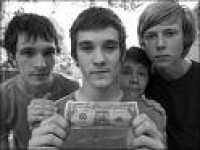Growing up is never easy, but when you’re in a band it often seems impossible. Make the same record twice and you’re chastised for being repetitive, but if you make too large of a sonic shift your fan base will desert you. Luckily Naples, Florida’s Fake Problems have never had to deal with this dilemma because with each release they’ve not only organically reinvented their sound, they’ve also successfully redefined who they are as musicians and human beings in the process. The culmination of this is the band’s SideOneDummy debut It’s Great To Be Alive, which shows Fake Problems’ unique brand of indie rock finally shaking off the insecurity and soul-searching of adolescence and sees the band embracing a sense of perspective that can only be gained by spending countless months on the road touring, laughing and writing music they believe in.
“There was no desire to make another How Far Our Bodies Go,” explains the band’s frontman Chris Farren explains, referencing the band’s 2007 breakthrough release. “We don't just want ourselves as a band to grow musically, but for the listener to grow and search out new music, too.” That’s exactly what the group—which also includes bassist Derek Perry, guitarist Casey Lee and drummer Sean Stevenson—aimed to accomplish with It’s Great To Be Alive... and it seems to be working. “It's amazing to see the encouragement and response we get; we're playing songs from our hearts and when someone you've never met can relate to those feelings, it's an incredible experience,” Farren continues. “I know when I write lyrics, I'm trying to explain a feeling I want someone else to understand.” In order to capture their creative vision for It’s Great To Be Alive the band packed up their van and headed to the cornfields of Omaha, Nebraska, where they spent two weeks tracking the album at ARC Studios with producer A.J. Mogis (Cursive, Rilo Kiley, The Faint). Although this might seem like an unconventional choice for a band who have toured with decidedly more aggressive peers such as Against Me! and the Riverboat Gamblers, Fake Problems were so prepared going into the studio they didn’t have to worry about getting bogged down with technicalities. “We knew exactly what order we wanted the record to be in and what auxiliary instruments we wanted to use on the songs,” Farren explains adding that Perry arranged the strings, Look Mexico’s Matt Agrella arranged the horns—and at one point the band even enlisted the help of a seven-piece horn section comprised of University of Nebraska students and teachers. The result is an album that combines the band’s punk rock roots with elements of folk and indie rock to create a unique amalgam of music that’s as distinctive as Farren’s soulful tenor. “I'm definitely influenced by my musical surroundings, so there was never any decision to make ‘this’ or ‘that’ kind of song,” the band’s frontman explains, listing everyone from alt-country crooners like Ryan Adams to troubadours like Bob Dylan and rock revivalists such as the Hold Steady as influences this time around. “We write songs that we would want to hear from other artists,” he elaborates. “We make music that we want to listen to, so it just wouldn't make sense to keep doing the same thing over and over again. From the sinister shuffle of “You’re A Serpent, You’re a She-Snake” to orchestral ballads like “Tabernacle Song” and intricately layered anthems like “There Are Times,” It’s Great To Be Alive is less of a traditional album and more of a sonic journey that refuses to be limited by genre constraints. “We're making plans to start playing shows with a horn section and a touring cellist,” Farren explains when asked how the band plans on recreating these songs live. “I love the dynamic and differences between a simple rock and roll set as well as a full orchestral production.” Lyrically, It’s Great To Be Alive’s parallels the musical progression the band have achieved with this collection of songs as well. “The last record was about being afraid to die, so this one deals with appreciating life and examining who you are and who you want to become,” Farren explains. However despite the positive nature of the album, songs like “Level With The Devil” and “The Heaven & Hell Cotillion” have a sinister edge to them. “You can't make a decision without exploring all of the goods and all of the evils; I'd say a lot of the lyrics deal with exploring the evils in my life and facing them,” Farren continues. “I don't believe you can really appreciate life until you are the person you want to be, doing what you want to do with confidence.” Ultimately, with It’s Great To Be Alive Fake Problems themselves don’t know quite where they fit in, but they’re confident enough in themselves to know that’s a blessing rather than a curse. “It's art, it shouldn't be about what cool club you fit in with,” Farren summarizes. “If our music is going to be appreciated, I'd like it to be because of our songs.”
Source: http://www.sideonedummy.com/bands_bio1205.php?band_name=fake_problems
